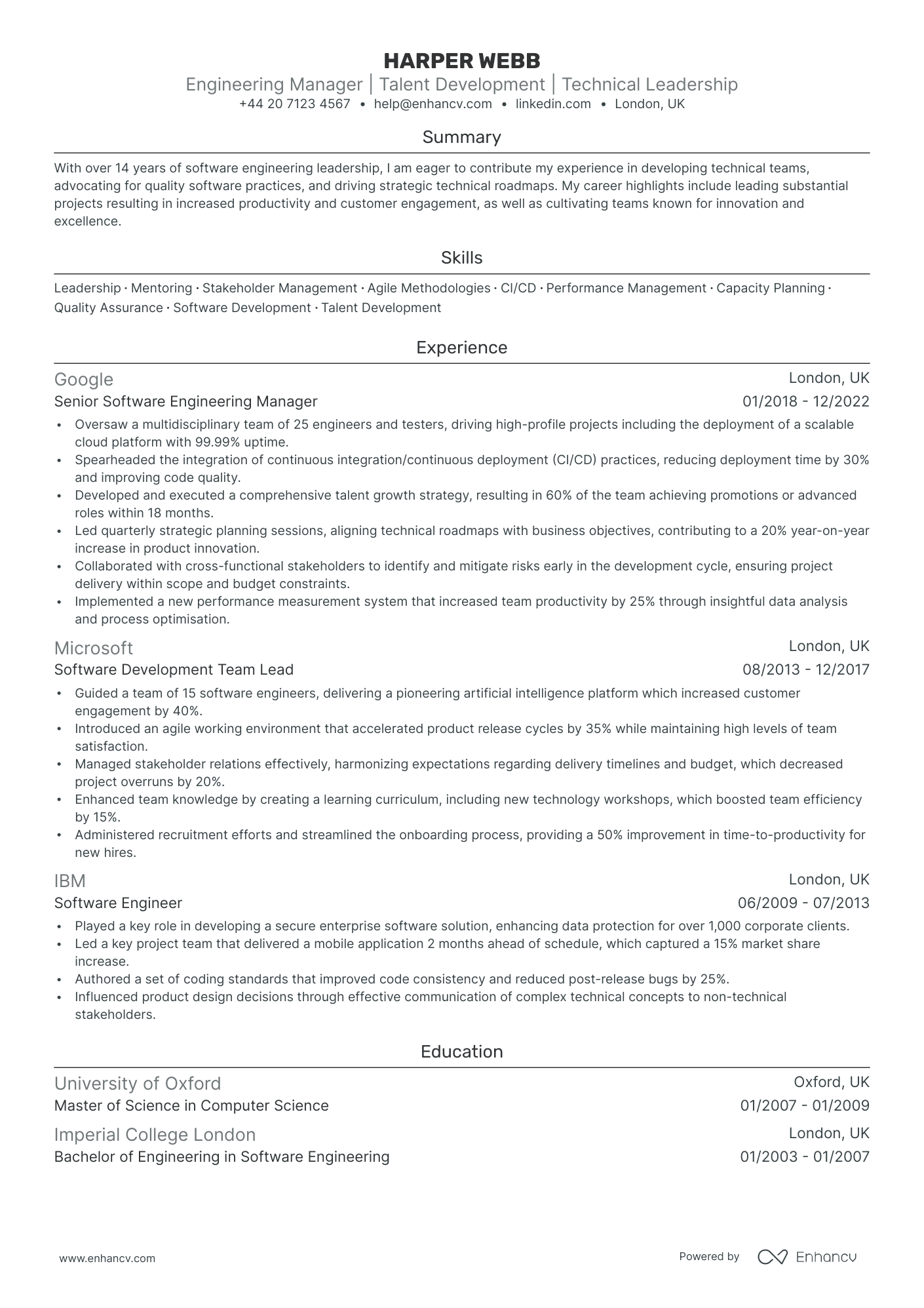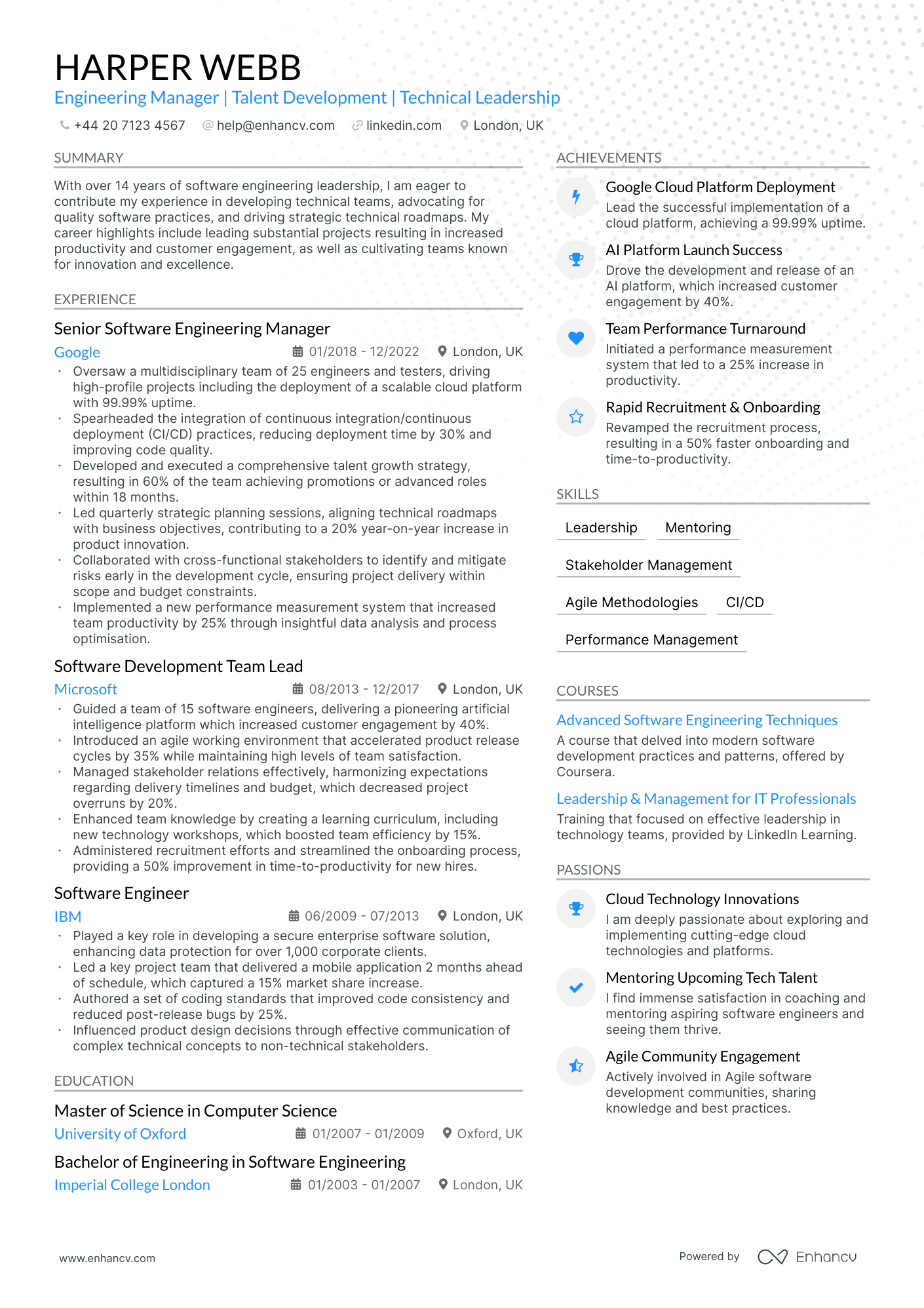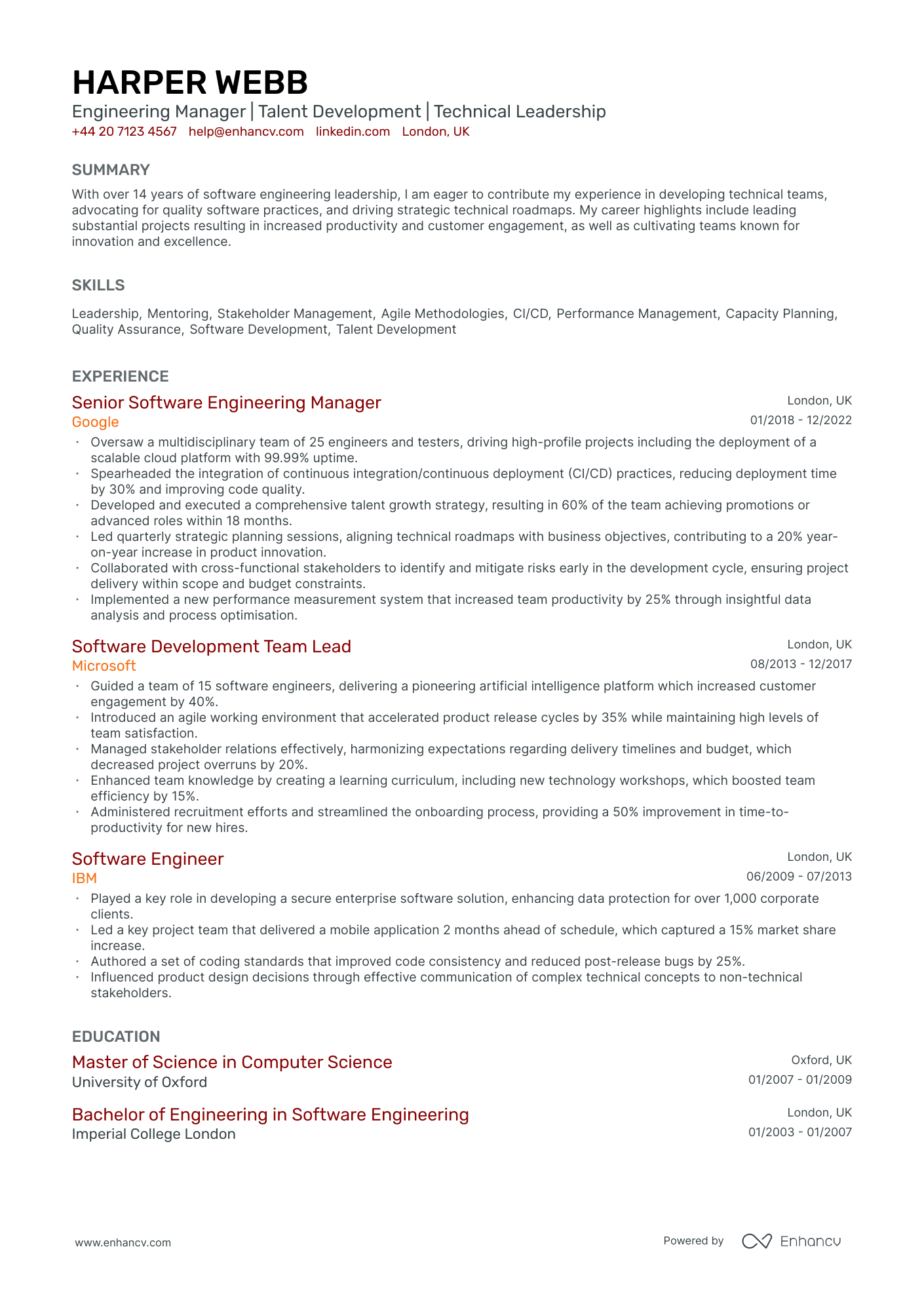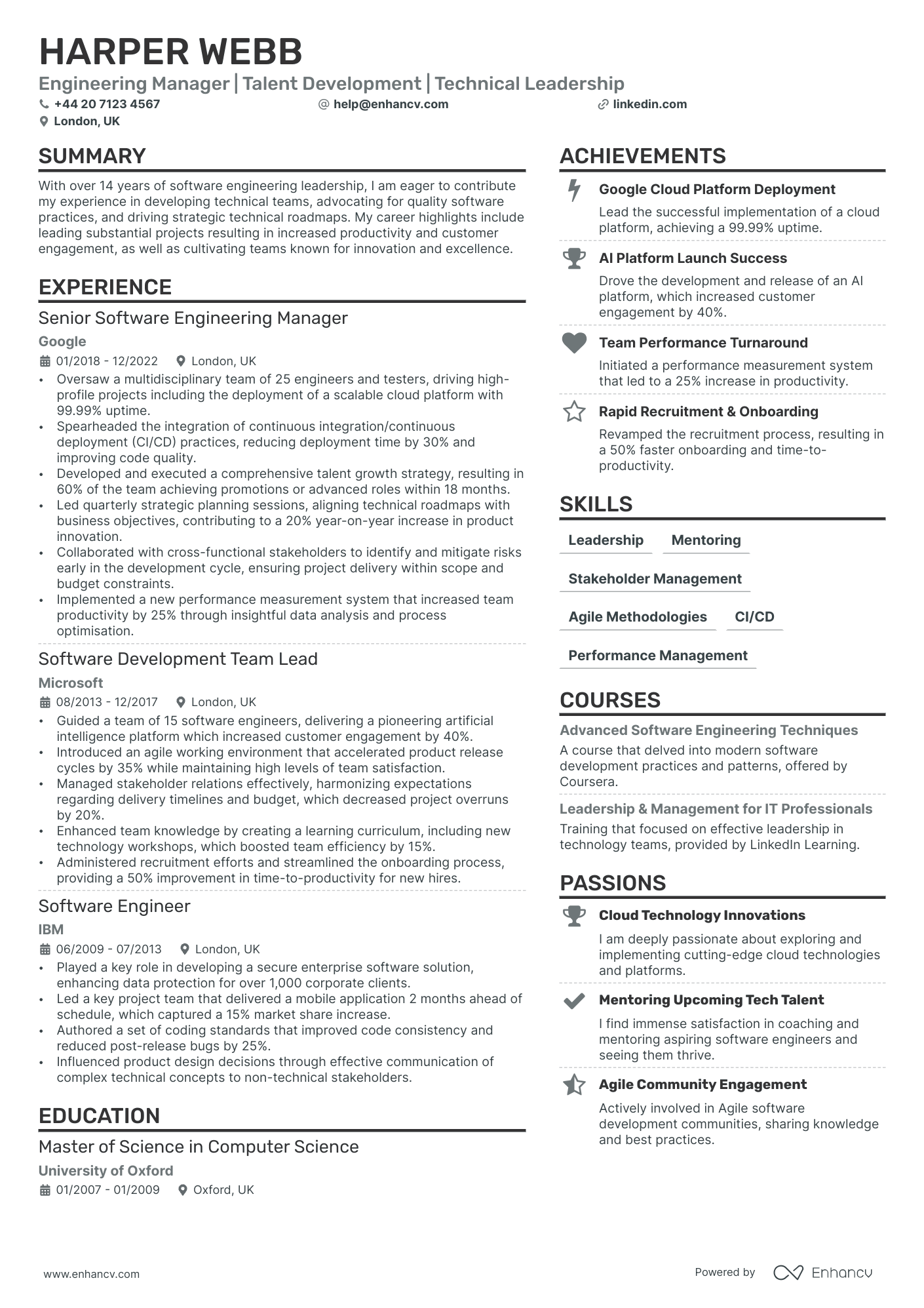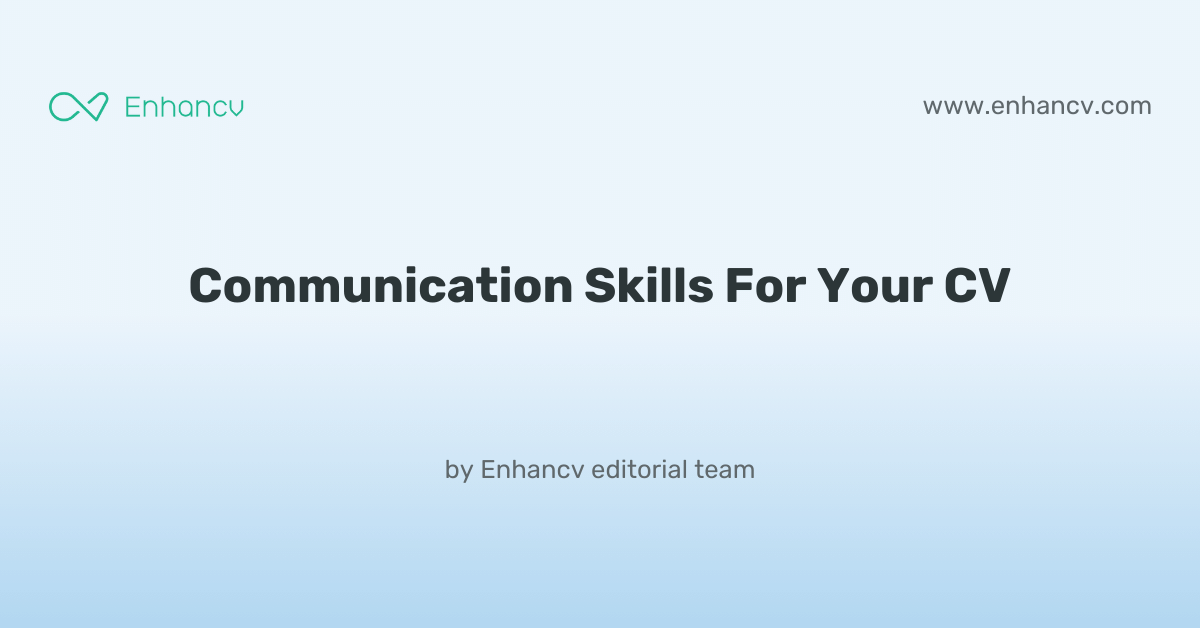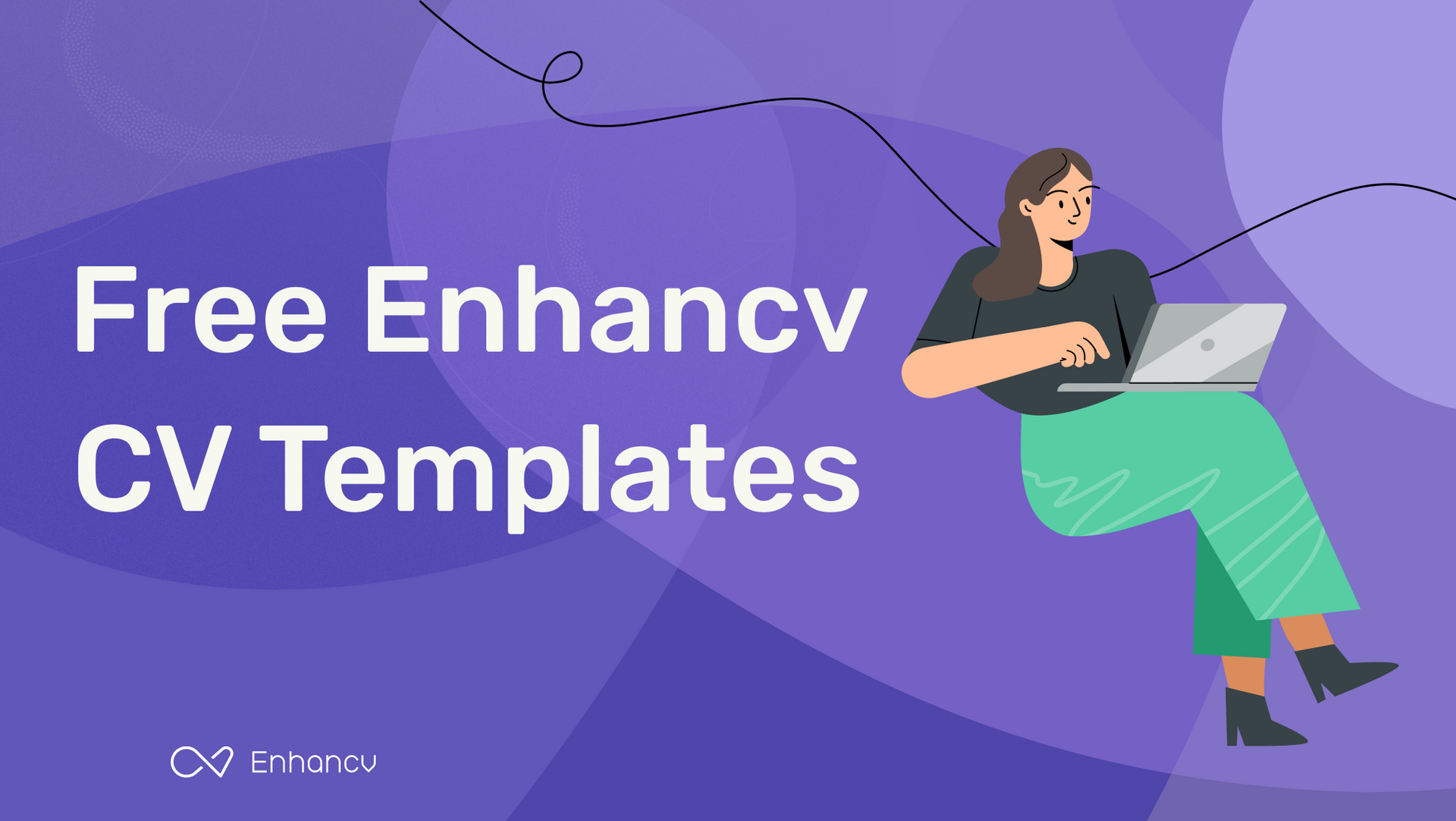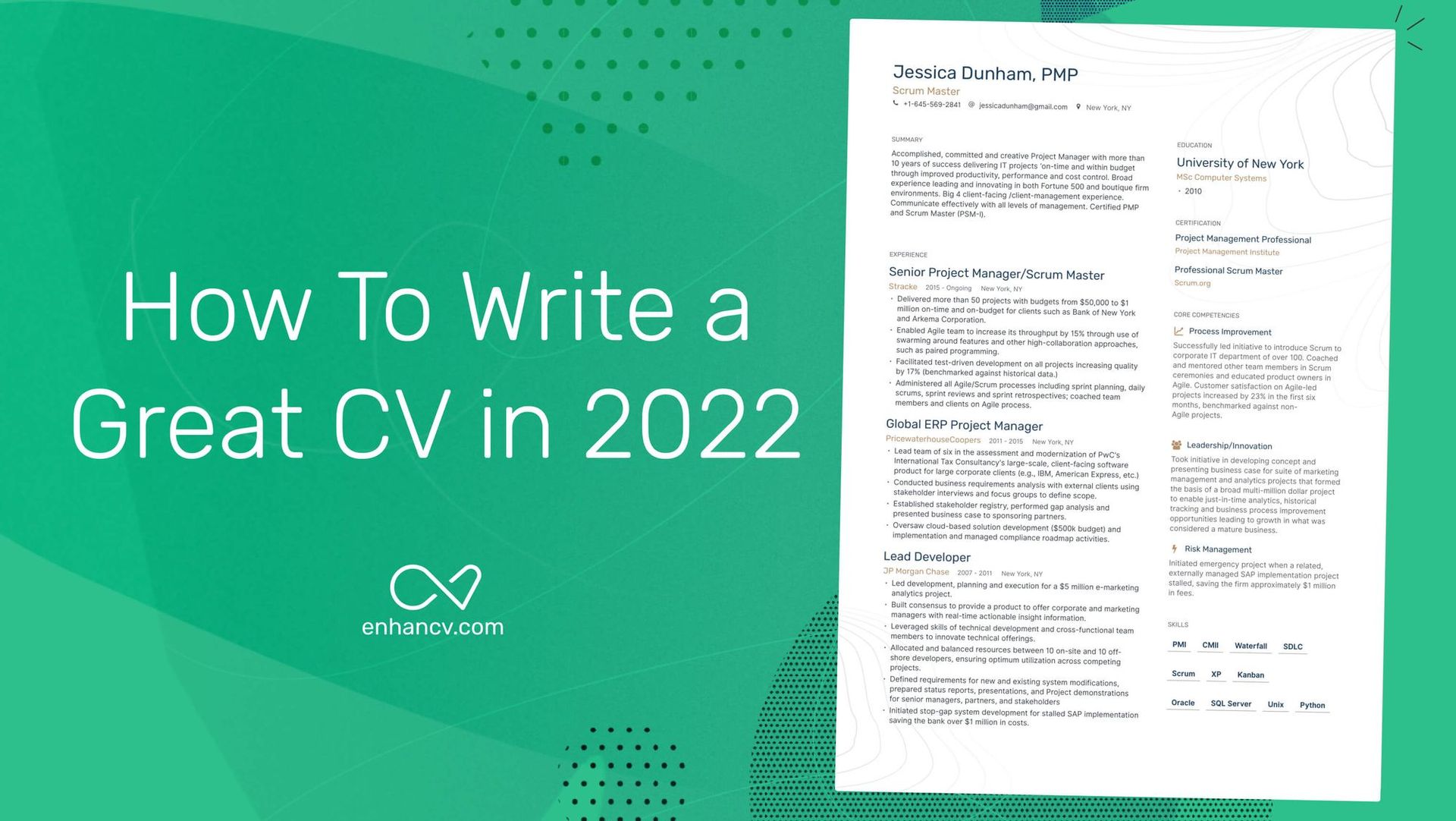One specific CV challenge you might face as an engineering manager is effectively showcasing your complex projects and leadership skills in a concise format. Our guide offers tailored strategies to highlight your experience and expertise, ensuring that your CV stands out to prospective employers.
- Answer job requirements with your engineering manager CV and experience;
- Curate your academic background and certificates, following industry-leading CV examples;
- Select from +10 niche skills to match the ideal candidate profile
- Write a more succinct experience section that consists of all the right details.
Do you need more specific insights into writing your engineering manager CV? Our guides focus on unique insights for each individual role:
- Chemical Engineer CV Example
- Construction Manager CV Example
- Audio Engineer CV Example
- Landscape Architect CV Example
- Aerospace Engineering CV Example
- Construction Worker CV Example
- Structural Engineer CV Example
- Quality Engineer CV Example
- Mechanical Design Engineer CV Example
- Infrastructure Engineer CV Example
Structuring your engineering manager CV layout: four factors to keep in mind
There are plenty of best practices out there for your CV layout and design. At the end of the day, a clear format and concise CV message should be your top priority. Use your CV design to enhance separate sections, bringing them to the forefront of recruiters' attention. At the same time, you can write content that:- Follows the reverse chronological order in the experience section by first listing your most recent jobs;
- Incorporates your contact information in the header, but do skip out on the CV photo for roles in the UK;
- Is spotlighted in the most important sections of your CV, e.g. the summary or objective, experience, education, etc. to show just how you meet the job requirements;
- Is no longer than two-pages. Often, the one-page format can be optimal for your engineering manager CV.
Before submitting your CV, you may wonder whether to export it in Doc or PDF. With the PDF format, your information and layout stay intact. This is quite useful when your CV is assessed by the Applicant Tracker System (or the ATS) . The ATS is a software that scans your profile for all relevant information and can easily understand latest study on the ATS , which looks at your CV columns, design, and so much more.
PRO TIP
Be mindful of white space; too much can make the CV look sparse, too little can make it look cluttered. Strive for a balance that makes the document easy on the eyes.
The top sections on a engineering manager CV
- Profile Summary to make a strong first impression.
- Relevant Experience to showcase management skills.
- Education & Certifications to prove your technical background.
- Key Projects to highlight leadership successes.
- Technical Skills to display engineering expertise.
What recruiters value on your CV:
- Highlight your experience with leading engineering teams, emphasising any successful projects you managed and how you improved processes or efficiency within those teams.
- Detail your technical expertise in relevant engineering disciplines, but also focus on demonstrating strategic thinking and long-term planning abilities.
- Include evidence of your ability to manage budgets effectively, showing how you've optimised resources and reduced costs without compromising on quality or deadlines.
- Outline your communication skills, giving examples of how you've coordinated between departments, resolved conflicts, and effectively communicated complex technical ideas to non-technical stakeholders.
- Showcase your commitment to professional development, both personal and for your team, by listing any relevant training or mentorship programmes you've introduced or participated in.
Recommended reads:
How to present your contact details and job keywords in your engineering manager CV header
Located at the top of your engineering manager CV, the header presents recruiters with your key personal information, headline, and professional photo. When creating your CV header, include your:
- Contact details - avoid listing your work email or telephone number and, also, email addresses that sound unprofessional (e.g. koolKittyCat$3@gmail.com is definitely a big no);
- Headline - it should be relevant, concise, and specific to the role you're applying for, integrating keywords and action verbs;
- Photo - instead of including a photograph from your family reunion, select one that shows you in a more professional light. It's also good to note that in some countries (e.g. the UK and US), it's best to avoid photos on your CV as they may serve as bias.
What do other industry professionals include in their CV header? Make sure to check out the next bit of your guide to see real-life examples:
Examples of good CV headlines for engineering manager:
- Engineering Manager | MSc in Mechanical Engineering | Lean Six Sigma Black Belt | 12 Years' Experience
- Senior Engineering Lead | Chartered Engineer | AI & Automation Specialist | New Product Development | 15+ Years
- Engineering Operations Manager | PMP Certified | Renewable Energy Innovations | Team Building Expert | 10 Years' Leadership
- Principal Systems Engineer | PhD in Electrical Engineering | Advanced Robotics | Strategic R&D Planning | 18 Years
- Engineering Project Director | Cost Optimisation Expert | Large-Scale Infrastructure | PRINCE2 Practitioner | 20+ Years
- Lead Software Engineering Manager | Agile & DevOps Evangelist | Cybersecurity Focus | BEng Computer Science | 8 Years
Choosing your opening statement: a engineering manager CV summary or objective
At the top one third of your CV, you have the chance to make a more personable impression on recruiters by selecting between:
- Summary - or those three to five sentences that you use to show your greatest achievements. Use the CV summary if you happen to have plenty of relevant experience and wish to highlight your greatest successes;
- Objective - provides you with up to five sentences to state your professional aims and mission in the company you're applying for
CV summaries for a engineering manager job:
- With over a decade of experience managing engineering teams for large-scale manufacturing processes, I bring an extensive portfolio of skills including lean manufacturing, process optimisation, and cross-functional team leadership. My career highlight includes delivering a 25% increase in operational efficiency through strategic automation initiatives.
- As a dynamic leader with 15 years in software development and a focus on AI technologies, I am adept at driving innovation in product design and implementation. Successfully led the development of an award-winning AI-based analytics platform, increasing company market share by 30%.
- Transitioning from a senior role in aerospace engineering to software management, I possess a strong foundation in systems engineering and project management, eager to leverage 20 years of experience to adopt cutting-edge software development practices and contribute to a tech-driven future.
- With an impressive 7-year tenure as a project manager and consultant in renewable energy, I am pivoting towards engineering management to employ my expertise in sustainable design and complex project coordination to lead impactful engineering solutions in a new and challenging environment.
- Keen to embark on a career in engineering management, I am equipped with a Master's degree in Engineering and a passion for problem-solving and innovative design. Eager to apply my academic training in a practical setting to facilitate efficient project delivery and contribute to technological advancements.
- As a recent mechanical engineering graduate, my objective is to integrate my conceptual understanding of engineering principles and my fervour for software development into a managerial pathway, where I can support teams in delivering high-quality engineering projects, embracing the latest industry trends.
Narrating the details of your engineering manager CV experience section
Perhaps you've heard it time and time again, but, how you present your experience is what matters the most. Your CV experience section - that details your work history alongside your accomplishments - is the space to spotlight your unqiue expertise and talents. So, avoid solely listing your responsibilities, but instead:
- adverts' keywords and integrate those in your experience section;
- Use your CV to detail how you've been promoted in the past by including experience in the reverse chronological order.
Before you start writing your engineering manager CV experience section, dive into some industry-leading examples on how to structure your bullets.
Best practices for your CV's work experience section
- Led a team of 10 engineers to deliver complex software projects, ensuring timely completion while maintaining industry standards for quality and performance.
- Devised and implemented a streamlined project management process that increased department productivity by 20%, evidenced by reduced time-to-market for new software features.
- Managed annual budget of £500,000, achieving a 15% cost saving by renegotiating supplier contracts and optimising resource allocation.
- Collaborated with cross-functional teams, including Product Management and Sales, to align on product development goals and create roadmaps that brought valuable features to market ahead of competitors.
- Introduced Agile methodologies to the engineering department, resulting in a 30% improvement in deployment frequency and enhanced team agility.
- Mentored junior managers and engineers, providing career development opportunities and facilitating a knowledge-sharing environment.
- Spearheaded the adoption of new technologies, such as containerisation and microservices, that improved system scalability and reduced infrastructure costs by 25%.
- Conducted quarterly performance reviews, setting objective KPIs and offering constructive feedback to foster a culture of continuous improvement.
- Played a pivotal role in the successful certification of the company's engineering practices to ISO 9001 standards, demonstrating a commitment to excellence in engineering management.
- Orchestrated the transition of software development practices to a fully Agile environment, increasing deployment frequency by 40% and reducing critical bugs by 25%.
- Drove the development and launch of the company’s flagship analytics platform, which captured 15% market share within the first year post-launch.
- Implemented a robust talent acquisition strategy that attracted and retained top engineering talent, decreasing team turnover rate by 30%.
- Oversaw a $10M budget for the R&D department, ensuring all projects stayed within budget constraints with a less than 5% variance.
- Initiated a partnership with leading universities that enhanced the innovation pipeline, resulting in 3 new patents for semiconductor technologies.
- Spearheaded a cross-functional project that improved system-on-chip design flow, reducing time-to-market for new products by 20%.
- Facilitated the integration of advanced machine learning algorithms into product designs, leading to a 35% improvement in performance.
- Managed a team of 50 engineers to deliver a critical update to the company's cloud infrastructure, enhancing system reliability by 40%.
- Executed a strategic pivot to high-demand IoT products, diversifying the revenue streams and capturing an additional 5% of the market within two years.
- Led the globalization of the engineering workforce, which involved establishing two overseas technical centers that increased engineering capacity by 50%.
- Enhanced the engineering project management process through the implementation of lean methodologies, which reduced project cycle times by 15%.
- Effectively managed the cross-departmental collaboration to develop a new automotive software solution, increasing annual sales by $20M.
- Pioneered the development of an AI-powered predictive maintenance system for production equipment, reducing downtime by 30%.
- Cultivated a culture of continuous improvement and innovation, resulting in the team’s winning of an industry award for 'Best Digital Transformation'.
- Managed the scope and delivery of a multimillion-dollar project to automate manufacturing lines, which increased productivity by 25%.
- Oversaw the implementation of engineering best practices that improved project delivery times by 18% without compromising on quality.
- Collaborated with sales and marketing teams to align engineering solutions with customer needs, contributing to a 20% increase in customer satisfaction ratings.
- Instituted a modular design philosophy that reduced material costs by 10% while maintaining product performance.
- Coordinated with multidisciplinary teams to successfully roll out a company-wide software upgrade that enhanced operational efficiency by 22%.
- Masterminded an energy conservation program in product design that led to a reduction in energy consumption of products by 15%.
- Implemented stringent quality control procedures that brought product defect rates down from 2% to 0.5% within a year.
- Directed the scale-up of production capacity through the optimization of equipment and processes, meeting a 40% increase in demand.
- Improved cross-departmental communication workflows, which shortened the problem-solving cycle from an average of 10 days to 3 days.
- Championed the development and release of three new engineering software tools which enhanced design capabilities and shortened design cycles by 30%.
- Developed a strategic plan to incorporate virtual reality in equipment testing, which enhanced the precision of test results by 20%.
- Efficiently reallocated resources to high-priority projects, which reduced overhead costs by 12% while maintaining project schedules.
- Cultivated partnerships with key suppliers that improved material quality and reduced lead times by an average of 25%.
- Implemented a comprehensive data analysis system for real-time project tracking, improving the on-time project delivery rate to 95%.
- Guided the engineering department through ISO 9001 certification, demonstrating the team's commitment to international quality standards.
- Negotiated with technology vendors to introduce cutting-edge software tools into the workflow, leading to a decrease in average project completion times by 10%.
What to add in your engineering manager CV experience section with no professional experience
If you don't have the standard nine-to-five professional experience, yet are still keen on applying for the job, here's what you can do:
- List any internships, part-time roles, volunteer experience, or basically any work you've done that meets the job requirements and is in the same industry;
- Showcase any project you've done in your free time (even if you completed them with family and friends) that will hint at your experience and skill set;
- Replace the standard, CV experience section with a strengths or achievements one. This will help you spotlight your transferrable skills that apply to the role.
Recommended reads:
PRO TIP
If applicable, briefly mention a situation where things didn’t go as planned and what you learned from it, demonstrating your ability to learn and adapt.
The CV skills' divide: between hard and soft skills
Of course, you may have read the job requirements plenty of times now, but it's key to note that there is a difference between technical and personal skills. Both are equally relevant to your job application. When writing about your skill set, ensure you've copy-pasted the precise skill from the job requirement. This would not only help you ensure you have the correct spelling, but also pass any Applicant Tracker System (ATS) assessments.
- Hard skills show your technological capabilities. Or whether you'll be a good technical fit to the organisation. Ensure you've spotlighted your hard skills in various sections of your CV (e.g. skills section, projects, experience) by including the technology and what you've attained;
- Soft skills pinpoint your personality and people or communication skills, hinting at if you'll easily accomodate into the team or organisation. Quantify your soft skills in your CV achievements, strengths, summary/objective, and experience sections. Always support your soft skills with how they've helped you grow as a professional.
Top skills for your engineering manager CV:
Project Management
Engineering Principles
Product Development
Quality Control
Budgeting
Technical Writing
Risk Management
Process Improvement
Software Development Life Cycle (SDLC)
Regulatory Compliance
Leadership
Communication
Problem-Solving
Decision-Making
Team Building
Strategic Thinking
Time Management
Adaptability
Conflict Resolution
Mentoring
PRO TIP
Use mini case studies or success stories in your CV to demonstrate how your skills have positively impacted previous roles or projects.
Listing your university education and certificates on your engineering manager CV
The best proof of your technical capabilities would be your education and certifications sections. Your education should list all of your relevant university degrees, followed up by their start and completion dates. Make sure to also include the name of the university/-ies you graduated from. If you happen to have less professional experience (or you deem it would be impressive and relevant to your application), spotlight in the education section:
- that you were awarded a "First" degree;
- industry-specific coursework and projects;
- extracurricular clubs, societies, and activities.
When selecting your certificates, first ask yourself how applicable they'd be to the role. Ater your initial assessment, write the certificate and institution name. Don't miss out on including the completion date. In the below panel, we've curated relevant examples of industry-leading certificates.
PRO TIP
If you have received professional endorsements or recommendations for certain skills, especially on platforms like LinkedIn, mention these to add credibility.
Recommended reads:
Key takeaways
Your successful job application depends on how you well you have aligned your engineering manager CV to the job description and portrayed your best skills and traits. Make sure to:
- Select your CV format, so that it ensures your experience is easy to read and understand;
- Include your professional contact details and a link to your portfolio, so that recruiters can easily get in touch with you and preview your work;
- Write a CV summary if you happen to have more relevant professional experience. Meanwhile, use the objective to showcase your career dreams and ambitions;
- In your CV experience section bullets, back up your individual skills and responsibilities with tangible achievements;
- Have a healthy balance between hard and soft skills to answer the job requirements and hint at your unique professional value.

